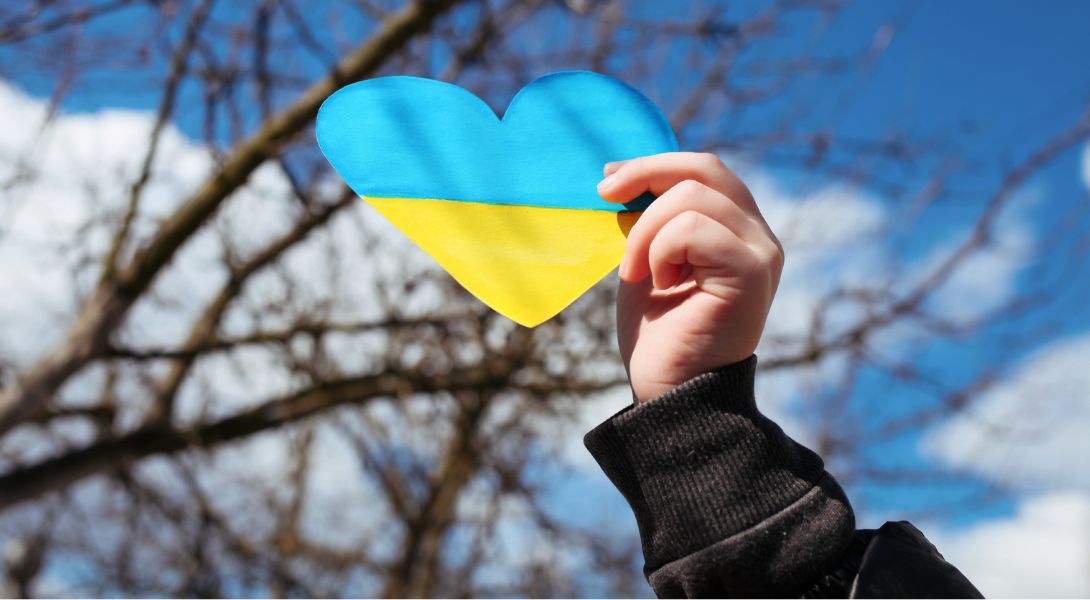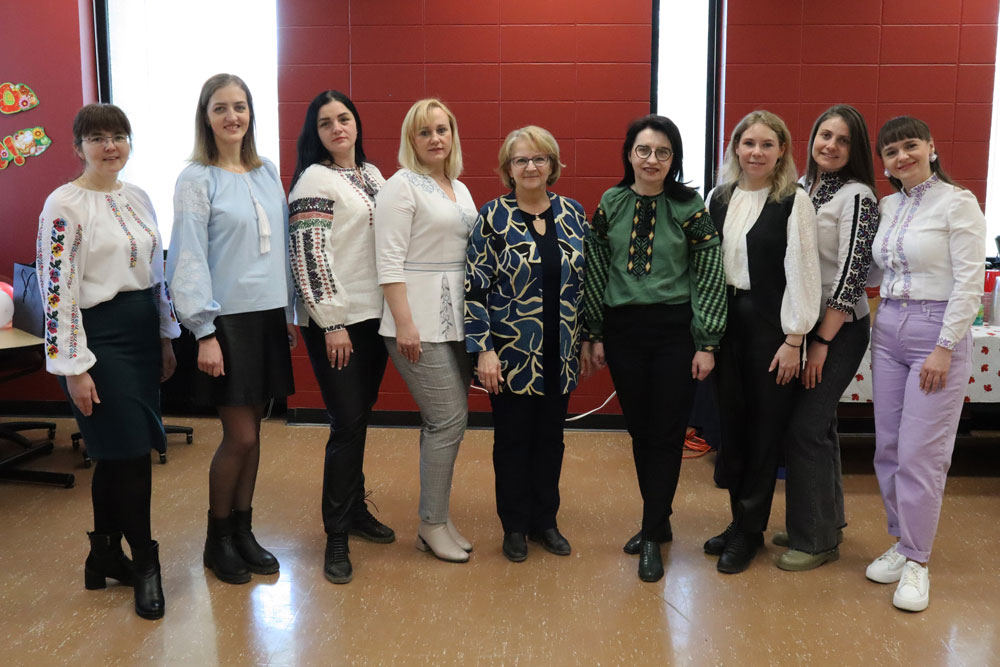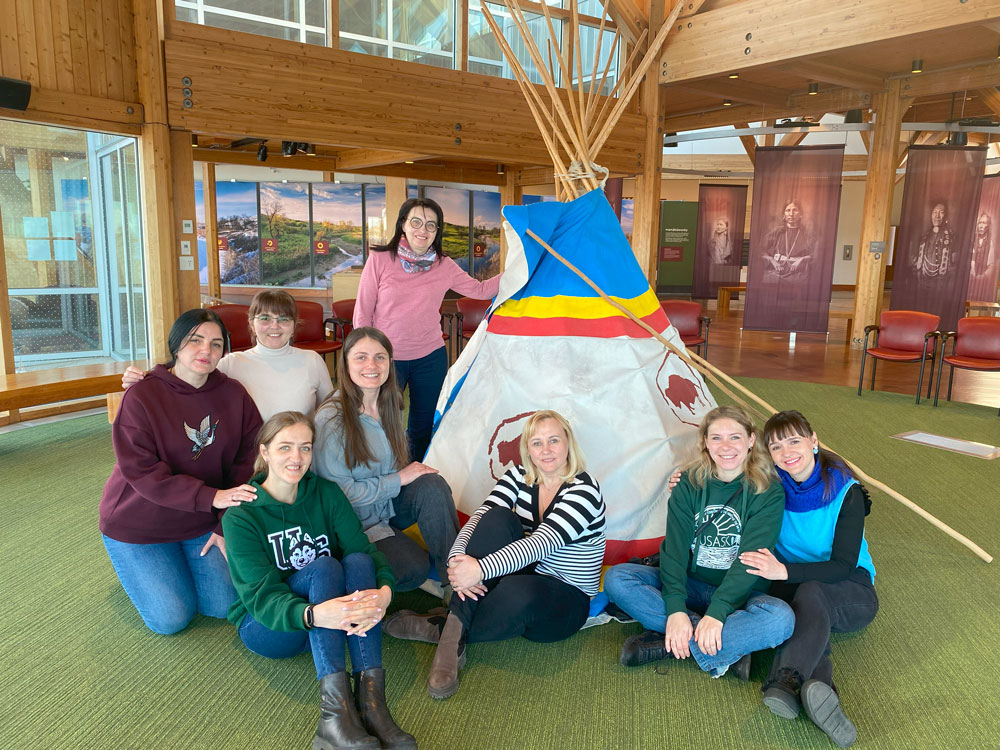
Teaching in a country at war
Ukrainian educators maintain resiliency and dedication to learning, amid escalating conflict.
By Meagan HintherTeaching in bomb shelters, living through daily air raid warnings, and helping students and families as they process displacement, loss and grief. These are a few of the daily realities impacting education in Ukraine while the country is at war due to large-scale Russian invasion.
Stories were shared by seven teachers from Ternopil, Ukraine while they were in Saskatoon March 3-24 for a course focused on current methods in teaching English as a global language, offered through the Saskatchewan Educational Leadership Unit (SELU) in the College of Education at the University of Saskatchewan (USask). All are English teachers from Ternopil elementary and high schools.
“What Canadians may not realize are the circumstances these teachers are experiencing. Every school has a bomb shelter and not all students can fit at once, so half the school may come one day and half the next, while the others learn online,” shared Nadia Prokopchuk, academic advisor and English as an Additional Language instructor in the Department of Curriculum Studies, who taught the three-week course. “As you can imagine, the stress and the trauma weigh heavily on everyone and is having an impact on education.”
“But this brave bunch of teachers who have lived through these trying circumstances so far and are going back to such conditions, these teachers are really the heroes in our presence right now,” Prokopchuk said.
Bomb shelters are now a prerequisite for in-person learning in Ukraine and the Government of Ukraine has worked with aid organizations like UNICEF to prioritize the construction of bomb shelters underneath schools. Some days, up to five hours may be spent in the shelters, which the schools have painted, decorated and refurbished to calm their students during difficult learning circumstances. There are also large-scale electricity outages experienced by the region. Ternopil is located in Western Ukraine and supports many internally displaced families fleeing from the front lines.
“We manage to deal with the disruptions. We survive and we are ready to work with different obstacles to help our students,” said Olha Vasko, a teacher with Ternopil Specialized School No. 3. “We have to get used to different challenges all the time.”
The teachers maintain positivity, stability and a fighting spirit for their students. They provide a source of motivation for students and encourage them to help in any way they can.
“My students and I are putting on food fairs, charitable lotteries to send gifts to the army. Every three to five months we send gifts to the fathers of my students that are fighting,” said Olena Aksak, a teacher with Ternopil Secondary School No. 13.
Every teacher has someone they love fighting at the front. Whether that is their husband, son, family member, neighbour or friend. Each one has lost someone dear to them, dating back to when Russia began its invasion of Crimea in 2014.
“Every day there are special horns that are heard across the city which means that the body of a hero is being brought back home to Ternopil. Every day. Unfortunately, all of us, we have somebody who is not coming back,” said Aksak, referencing the special vehicles bringing fallen soldiers back home, honouring their service and memorializing their heroism by inscribing their names on the Ukrainian trident and shield displayed in the city’s central square.
Halyna Bilous, a teacher with Ternopil Secondary School No. 11, has three sons at home aged 14, 19 and 21. Her husband has been fighting on the front lines for the past two years.
“We have no other choice; we have to defend. It’s our land, our children are there, and we have to support their future,” said Bilous.

English as a global language
The teachers attended USask through a partnership between Ternopil Volodymyr Hnatiuk National Pedagogical University (TNPU) and the College of Education to help build English language teaching capacity in Ukrainian schools. They were accompanied by TNPU professor Dr. Olena Huzar (PhD) and government education officials. Dr. Vicki Squires (PhD), associate dean, research, graduate support and international initiatives in USask’s College of Education, worked with staff Megan Fillatre and Greg McJannet and Holly Mayes with SELU to create a robust schedule for the project.
“English is going to be one of the global languages that moves the country forward towards European integration. The teachers have come here to learn about English teaching strategies from a North American perspective and expand their knowledge base,” said Prokopchuk.
The partnership arose from a longstanding relationship between TNPU and St. Thomas More College (STM) at USask. Since 2003, Huzar has been working with partners at STM to bring students to Ukraine for study abroad courses.
“For 15 years, students from the University of Saskatchewan came to our university in Ukraine – to Ternopil, to improve and study the Ukrainian language. But now our Ukrainian teachers are coming here, to learn English,” said Huzar. “This is the first time we send students to your beautiful city, to the University of Saskatchewan, to the College of Education, with the idea of growing English not as a foreign language, but as a global language.”
“In essence, we have exchanged languages,” Huzar said.
At the end of the three-week course, the teachers made brief presentations based on what they had learned and the strategies they will be taking back to their classrooms. In the weeks and months ahead, they will present their new knowledge to fellow English teachers as well as pre-service teachers at TNPU. Squires will work with Huzar and Prokopchuk to evaluate the program’s success as part of an ongoing research partnership.
“Now the hard work just begins, because you have to transfer this to your classrooms in Ukraine. Then the proof of your success will be known,” said Huzar, while addressing the group.
Many of the teachers referenced new strategies that will help them meet the needs of their students. Because of the instability and constant anxiety, learning is challenged in a myriad of ways.
“The psychological condition of our students is vulnerable, so using positive suggestions in teaching strategies that help promote English language learning is so helpful,” said Vasko. “This course was useful, informative, and the structure is so easy to grasp. The material is arranged in a systemic way and the topics are perfectly chosen. We really need this.”
Others spoke of the helpful new strategy of using a child’s first language to support second language development.
“It’s widely accepted in Ukraine that if you’re a good teacher, you use nothing but English in your classroom, but here I’ve learned that using Ukrainian can be a source of support to build a child’s English language skills,” said Mariana Marets, with Ternopil Educational Complex School-Lyceum No. 6.
The three-week intensive study program was paired with cultural activities, local Saskatoon school visits and learning opportunities to provide an immersive English language experience as well as an introduction to Saskatoon’s Ukrainian community.
“This program gave us opportunity for motivation, but also some kind of relief. Because when we are here there is the possibility to be distracted a little bit from the worries that burden us at home. We have had the opportunity to have a little fun and enjoy the city,” said Marets. “On the street, often we meet people with Ukrainian roots and who know Ukrainian words. We feel so welcomed.”
“We also feel the support of the Canadian people to Ukrainian people and to the Ukrainian Army. That is very important to be here knowing that you are a nation that supports us,” Marets added.
The College of Education presented the Ukrainian delegation with dreamcatchers handcrafted by local Métis artist Corine Caplette in the colours of the Ukrainian flag, meant to symbolize the desire for a peaceful future for the people of Ukraine.
An important component of the visit was introducing the Ukrainian educators to the history of Indigenous peoples in Treaty 6 Territory and the impacts of Indigenous teacher education at USask, including meeting with staff from the Indian Teacher Education Program and the Saskatchewan Urban Native Teacher Education Program. A highlight was an afternoon spent at Wanuskewin Heritage Park and taking part in Tipi Teachings, snowshoeing and exhibit tours.
“The teachers were very moved by their visit to Wanuskewin. They could relate to the deep love of land, language, and culture among Indigenous people and were so engaged in learning about Cree culture,” said Prokopchuk.

Embraced and welcomed
“We’ve had so much support and hospitality for this group. The university, city and province have really opened their doors to welcome this group of visiting teachers,” said Prokopchuk.
In addition to the College of Education and TNPU, the program’s sponsors included the Government of Saskatchewan’s Ministry of Advanced Education, USask International Office, USask Culinary Services, Ternopil Regional State Administration, Ternopil City Administration, Prairie Centre for the Study of Ukrainian Heritage (STM), Ukrainian Canadian Congress of Saskatchewan, Ukrainian Catholic Brotherhood (Bishop Roborecki Branch), and the Ukrainian Orthodox Self-Reliance League.
A renewed partnership and commitment to collaboration was also established through a Memorandum of Understanding (MOU) signing ceremony on March 12. The signatories included USask (College of Education), TNPU and STM.
“Today’s ceremony will offer many shared opportunities for learning, for growth and exchange of talent across all industries in both Saskatchewan and Ukraine,” said Minister of Advanced Education Gordon Wyant at the signing. “[This MOU] is leveraging the strengths of both institutions and further reinforcing the very important relationship between our province and Ukraine.”
Accompanying the teachers for the first half of their visit were government education officials for the region: Olha Khoma, head of the Department of Education and Science with Ternopil Regional State Administration, and Olha Pokhylyak, director of the Department of Education and Science of the Ternopil City Council. During the MOU ceremony, they spoke about the benefits of the program as well as what the region is experiencing.
“We do want our children, our students, to study in our Ukrainian schools. That’s why we want to learn from you, we want our education to be better as well,” said Khoma. “Today our teachers are on the front line, they are teaching students in very difficult conditions. But still we do it and fight. We are strong, we won’t leave Ukraine and the enemy won’t destroy us.”

